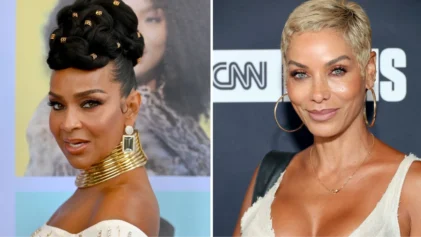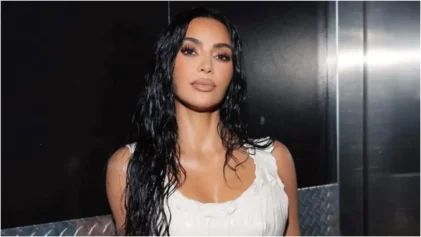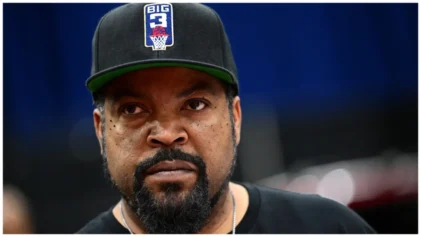Zeus Network CEO Lemuel ‘Lemmie’ Plummer has known that he wanted to change the television game since he was a kid and used the business savvy that he picked up over years of growing up around and working in the industry to put his own spin on the subscription service business model.
The Subscription Video On Demand boss launched the platform in 2018 and it has rapidly grown in popularity thanks to its roster of well-known reality stars. “Joseline’s Cabaret,” “The Real Blac Chyna,” “Baddies ATL” and “One Mo’ Chance,” are among Zeus’ most well-known shows and give fans a good dose of what Plummer aims to deliver — content that “is very raw, it’s very authentic; it’s very real.”
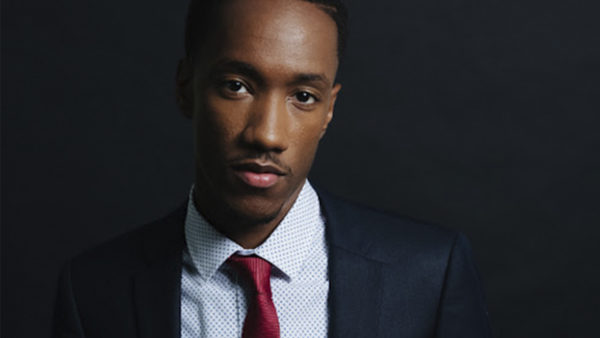
With parents who owned and operated multiple television stations in Detroit throughout his childhood, Plummer was immersed in the intricate ins and outs of the behind-the-scenes business aspects of the industry from a young age, which fueled his initial interest in working in the field. As he grew up, Lemuel continued to commit himself to projects with networks including BET and Oxygen, but the success of Netflix was what ended up inspiring him to take a chance on himself by creating a seat at the SVOD table.
The television executive spoke with Atlanta Black Star about what makes the platform’s content stand out from other reality shows, which recognizable faces Zeus fans can expect to see hit the service soon, and what he has to say to any networks that may view them as competition.
You grew up, both your parents own television stations, so you grew up seeing the ins and outs of how everything worked, but at what point did you realize that this was something that you wanted to do for yourself? Was it always what you envisioned because it was around you all this time?
Yes. I was very fortunate and blessed to have parents who wanted to create and launch their own network because they had multiple networks that at one point were international linear channels … I gravitated to it at a very young age, and it just sparked significant interest …This is something that I find to be exciting and something that I think has an impact on our culture and our generation. I jumped right at a very, very young age.
Can you talk a little bit more about Zeus Network specifically and how the inception of the whole network came about?
The Zeus Network is a subscription video-on-demand platform. We charge $4.99 a month for access to our content. We’re available everywhere, globally. If you have any type of iOS device, we’re on all of the major Apple products. Obviously, your iPhone, Apple TV, iPad, etc. We’re available on every Android product, Roku, we’re available on Google Chromecast, X-Box. And all smart TVs, Amazon Fire Stick. We’re pretty much available everywhere. You can get our content in any major country, obviously, including the United States.
Zeus, we create content for our specific audience that we find to be interested in the type of programming that we create. Right now, we have a lot of unscripted programming, and we have some short-form content on there as well, both scripted and unscripted. We’re looking to diversify our content up a little bit more as we continue to grow and scale the company. I got into the business because it was important for me to own my own network.
I always had this desire to really launch my own network. For me, I realized it wasn’t a lot of people really trying to launch subscription video-on-demand platforms that happened to be Black-owned. It was important for me to figure out a way to make it happen. Prior to launching Zeus, I had a full-service production company. Prior to that, I had a deal at BET…but I just got to a point where I realized I didn’t own the content.
I just felt it was important to create my own network and space and to be able to do my own thing, and not have to fight or struggle to sell a show and to get something off the ground. It’s a brutal process trying to sell a show to a network, especially a linear network…
I was very fortunate because I had two investors, Jonathan Rogers and Harold Lewis, who invested in my company and we were able to, again, sell shows and go straight to series. That really helped me to start thinking about my next move after several years of selling shows. Then when I saw what Netflix was doing, what their whole philosophy was for their customers, it was about convenience, choice and control. Once they started announcing publicly how many subscribers they had and how much revenue they were bringing in, it all made sense in the industry.
I just realized early on, that was the new way. I was already on it even when Netflix was mailing the DVDs and when they were available just on your computers. Then when they started to make themselves available on every major device. I said, ‘These guys are onto something.’…
When they allow people to binge the episodes, it just took it over to the top. I said, ‘That’s what I want to do. I want to figure out a way to be a player in that space.’…You don’t have to censor the content. It could be raw and uncensored and unfiltered, that was where my mind was heading towards. I just said, ‘I got to create a platform for our culture or our audience,’ and that was what I did.
What made you want to go toward unscripted television as opposed to other formats that are out there?
When I first launched Zeus, I invested in a lot of short-form content and both scripted and unscripted. For me, scripted costs a little bit more and it takes a little bit more time to get those shows off the ground. When you’re investing in scripted, you’ve got to just know that this is going to be something that people are going to pay to watch. You’re investing significant money; you’re taking your time a little bit more….
It’s easy for me to know how to deliver and facilitate long-form content in the reality space at a high level…After experimenting with the first launch, it was like, ‘Okay, I tried it with the influencers who had the five, 10, 20 million followers invest in whatever projects they wanted to do and gave them the tools that they need, that didn’t quite move the needle.’ I just said, ‘Let me go back to what I was doing and focus on unscripted and more traditional talent and structuring deals a little bit differently so that there’s an incentive for them to want to market it and push it hard, but at the same time create something high quality.’
One of our first shows we did that did really well for the network was a dating show called ‘TiTi Do You Love Me,’ [and B. Simone’s] ‘You’re My Boooyfriend’ did really well. After that, I invested in ‘The Real Blac Chyna,’ and that just really took us over the top…Chyna did a great job, her mom was a part of it as well…At that point I realized, people had an appetite to want to pay to see this type of content. We started investing in Joseline, Ray J…’One Mo’ Chance,’ and the list goes on and on.
Mona Scott-Young and some others have been called out just throughout the years for saying… people have said that reality TV can exploit the negative sides of black culture so what are you doing, I guess, differently to go against those specific viewpoints of reality TV?
I mean look, a lot of people would maybe argue that our content could be somewhat salacious, or conflict-driven. I just like to say our content is very raw, it’s very authentic, it’s very real. For me, it’s not that we try to force the shows down people’s throat and say, ‘Look, go watch all this.’ This stuff that you would call, so to speak, either controversial, or loud, or provocative, or salacious, it’s just what people tend to watch. For me, we definitely want to, again, diversify our content. We just happen to create shows with certain content creators, and they have a vision and they come off on camera certain ways. For instance, ‘Baddies ATL,’ people are pretty familiar with those types of characters in that world, in that environment.
We just feel like, ‘Hey, that was a huge hit for a network like an Oxygen, let’s do something different over here at Zeus.’ That’s what we ended up doing with these particular stars. Joseline was on Love & Hip Hop and she did her thing, but she wanted to do a different show. Her show was about creating this ‘Joseline’s Cabaret’ universe and world and giving these dancers an opportunity to get out of the streets and do something different with their lives. When you put all those personalities in a room or a house together, it’s going to be some conflict, it’s going to be some moments where people will question our producers forcing this type of content, and we don’t. Again, for me, it’s about being authentic.
It’s about giving the audience something that’s raw and real, uncensored, unfiltered, and that’s what we’re doing. So, I can’t speak to what Mona Scott, and VH1, and all those guys do. All I know is when it comes to Zeus, whatever reality show like we have a show with Draya Michele that’s coming out. It’s not as provocative and, so to speak, salacious as maybe some of the other shows. We’ll see how the audience reacts to it. But if they’re not paying or if they don’t want to watch that, I’m not going to keep investing money in shows that people just don’t want to see or certain formats that people don’t want to see. But if they’re paying to see this and they’re talking about it, and they’re laughing… Because let’s take a show like Joseline, her show went viral every week one way, shape, or form. Whether it was conflict, whether it was some type of levity moment, comedic moment that happened.
…If you truly watch our content, most of the series aren’t just all about that. You may see a clip online and assume,…but no, our audience is engaged. They watch, they pay, they stay subscribed.
… I think the goal for us is to keep creating programming that is loud, and provocative, and authentic, but also diversify it up. That’s what my plan is. I want to get into more live programming. I want to get into more scripted. I want to explore more worlds with reality TV. The unfortunate thing is I just don’t have unlimited budgets. I independently invest in Zeus so every dime that we make, we get, we do our best to invest as much as we can into the content … I just ask people to be patient, just be patient and give us the opportunity, we hear you. We want to create more shows that are different. We get it, trust me, I hundred percent get it…
Whatever Mona’s doing, I just don’t want to be compared to that type of business …I have nothing against Mona at all. I think, she’d done a great job with obviously being a businesswoman and creating a show that has been franchised as multiple seasons that really put VH1 on the map so kudos to her. I’m not Mona Scott. I’m not any of these other producers that are out there. Whoever’s doing their thing, congratulations. Do your thing and wish you nothing but the best. But Zeus is a different beast.
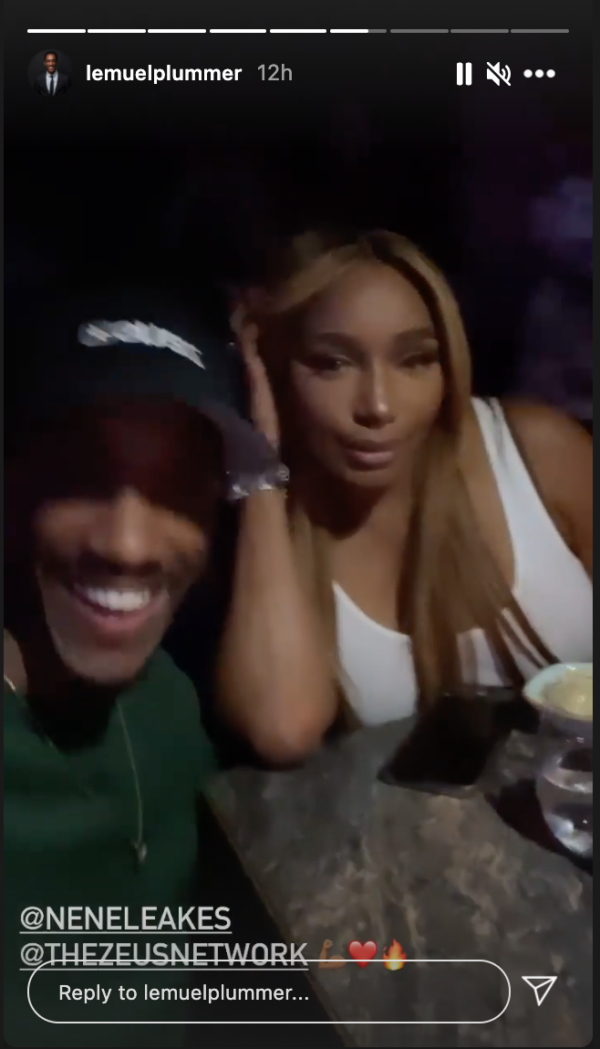
We actually did a story on Atlanta Black Star a few months ago about, you were out with Nene [Leakes] and you guys looked like you were having a good old time just hanging out. Are you anything we can expect there?
Yes, yes. We’re in negotiations right now.
Okay, and that’s all you can say?
That’s all I can say. We’re negotiating to do some really cool things when he needs so I’m hopeful and optimistic about that partnership.
Do you feel like networks are kind of threatened by what you have going on?
We’ve had VH1 send cease and desist letters because of some of the talent and folks that we’ve been working with. I’ve talked to the COO of Viacom. A great call, great guy, very respectful, a very respectful call. But yeah, I don’t think Viacom necessarily looks at us as a threat, but I think that some of their channels definitely feel like we’re so-called treading in their space, which to me isn’t their space. But yeah, networks are watching. They’re paying attention, and I’ve always kind of went off of the philosophy of really never let them see you coming. Now that they kind of see us here and coming, I think they probably look at us as competitors. But not really something that I think about.
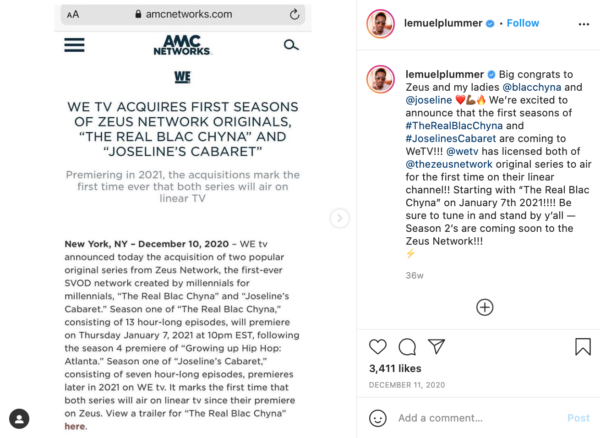
What are some personality traits that you look for in reality stars?
We definitely look for characters, whether it’s for comedic purposes, or just authenticity, or a variety of different reasons. I mean, it just depends on the show. If it’s a dating show, we try to find characters who are passionate about wanting to compete, and that’s what we end up doing, we cast those folks that we think have a great shot at winning the competition or at least bringing something special to the project. When it comes to docu-series, we definitely want people who have a little bit of a following and a solid following and audience, but also that is loud, not afraid to be themselves and raw. I mean, being authentic is really, really, really important.
If you can come off in a way that doesn’t feel produced or that doesn’t feel like you’re either doing too much or too little, or you’re just not being true to yourself, then we don’t really want to develop shows or have those folks participate in our shows.
What kind of legacy do you see yourself leaving in this industry as you’re continuing to build your empire?
At the end of the day, my motto has always been to change the generation. I want to impact our community, our culture, and say, ‘Look, you can own your own network. You can own your own production company. You can do some incredible things.’ I think a lot of times people are undervalued and I want to be able to give people the opportunity to say, ‘Look, I am valuable. I can do it. I don’t care what traditionalists say about how I have to do certain things.’ There’s no formula, there’s no format really when it comes to this… You just have to take risks. You have to educate yourself on the business, whether it’s hands-on, or where do you go to school, or whatever you do. Get as much information, as much data, as much knowledge as you can, as far as the craft that you’re pursuing.
For me, ownership is something that is special to me. It’s very important for us as African-Americans to really create a different mentality than just being a talent or being an employee. We need to get to the place where we’re owning our stuff, where we’re bosses. To me, that’s one of the marks that I want to leave and when it comes to everything that I’m doing. I like being the first black person that really do certain things, launching an SVOD. I think I was probably the first young, 30-something-year-old African-American network owner so that was a big deal saying, ‘Hey, in my twenties I’m probably the first African-American, 24- , 25-year-old owning a full-service production company, selling shows to networks.’ … I mean, there’s a lot of major conglomerates that own this space, whether it’s Comcast, or Dish Network, or Spectrum, or DirecTV. We just don’t really get those opportunities to own that.
